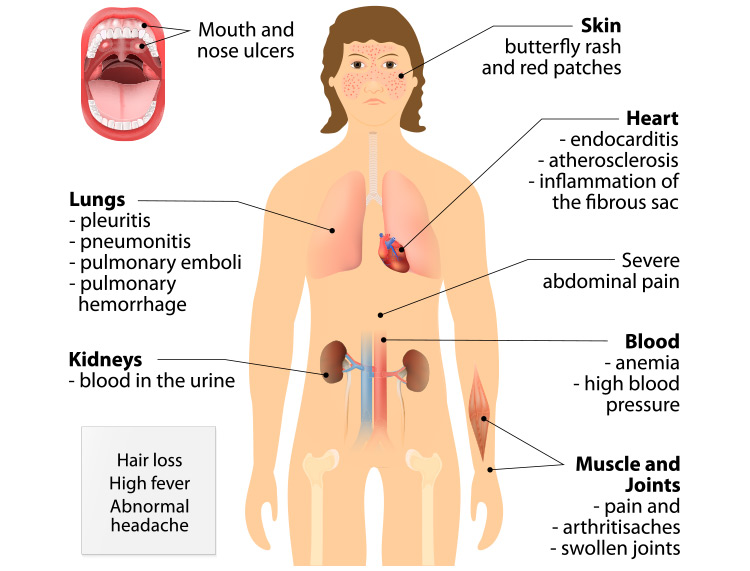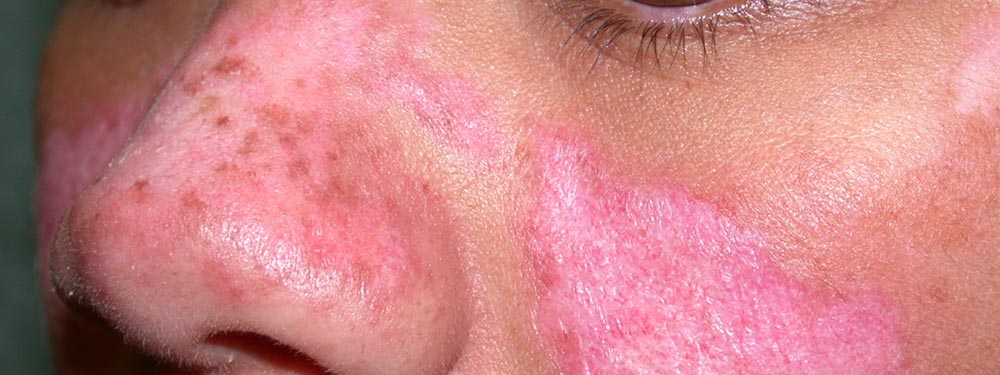Systemic Lupus Erythematosus (SLE) is a inflammatory disease that affects the joints, skin, kidneys, blood cells, brain, heart, and lungs.
When it is working normally, the body’s immune system kills germs and “bad” cells that could turn into cancer. Sometimes, instead of killing only bad cells, something goes wrong and the immune system starts to attack healthy cells. That is called an autoimmune response. It is what happens in lupus. In other words, if you have lupus, your body is attacking itself.

Symptoms of Systemic Lupus Erythematosus
Lupus symptoms can vary greatly from person to person. Some examples of symptoms include fatigue, weight changes, fevers, headache, rash shaped like a butterfly across the face, sun related rash, hair loss, joint pain and stiffness, mouth sores, cold fingers that turn pale or blue, and more.
Diagnosis of Systemic Lupus Erythematosus
Lupus is chronic and complex, and is often difficult to diagnose. To diagnose lupus, a doctor should be able to find physical or laboratory evidence of the condition, such as swelling of joints, protein in the urine, fluid around the lungs or heart, or a skin biopsy (test of a sample) that shows evidence of the disease. The doctor also will look at a person’s medical history and special tests to rule out other diseases.
Typically, four or more of the following criteria must be present to make a diagnosis of systemic lupus.
- Malar rash
- Discoid (skin) rash
- Photosensitivity
- Mouth or nose ulcers
- Arthritis in two or more joints, along with tenderness, swelling, or effusion.
- Cardio-pulmonary involvement:
- Neurologic disorder
- Renal (kidney) disorder
- Hematologic (blood) disorder
- Immunologic disorder
- Antinuclear antibodies (ANA)
Treatment of Systemic Lupus Erythematosus
It can help to eat a healthy diet, full of fruits and vegetables. It’s also important to stay active, even if you do not feel well. If you rest too much, your muscles will get weak and you might feel even worse later.
There are medicines that can ease lupus symptoms, decrease the autoimmune response, or both. These medicines include NSAIDs such as ibuprofen or naproxen, hydroxychloroquine (brand name Plaquenil) or chloroquine which were originally made to treat malaria but can help treat lupus, steroids and also an IV medication called Benlysta can be utilized for treatment if a patient has failed standard therapy medications.
Prevention of Systemic Lupus Erythematosus
There is currently no way to prevent lupus. But people who smoke may be more likely to get lupus. Avoiding smoking and perhaps other tobacco products may decrease your risk.
Need Help Affording Medications?
Patients who are having difficulty paying for their medications, and who have federally funded Medicare, Medicaid, TRICARE, or commercial insurance, may qualify for additional support from the following foundations below:
- Chronic Disease Fund | www.cdfund.org | 877-968-7233
- Patient Access Network Foundation | www.panfoundation.org | 866-316-7263
- The Healthwell Foundation | www.healthwellfoundation.org | 800-675-8416
- Patient Advocate Foundation | www.copays.org | 866-512-3861



